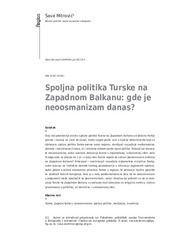Приказ основних података о документу
Spoljna politika Turske na Zapadnom Balkanu: gde je neoosmanizam danas?
Türkiye’s foreign policy in the Western Balkans: Where is Neo-Ottomanism today?
| dc.creator | Mitrović, Sava | |
| dc.date.accessioned | 2024-02-26T10:46:25Z | |
| dc.date.available | 2024-02-26T10:46:25Z | |
| dc.date.issued | 2023 | |
| dc.identifier.issn | 2217-7000 | |
| dc.identifier.uri | http://rfpn.fpn.bg.ac.rs/handle/123456789/1167 | |
| dc.description.abstract | Ovaj rad predstavlja analizu spoljne politike Turske na Zapadnom Balkanu od dolaska Partije pravde i razvoja na vlast do danas. Autor najpre pruža uvid u ključne determinante koje su oblikovale spoljnu politiku Turske prema ovom regionu, utvrđujući najvažnije međunarodne, domaće i individualne činioce, ali i istorijske determinante njene politike. Polazeći od koncepta neoosmanizma, autor analizira delovanje Turske u diplomatskoj i ekonomskoj sferi, kako bi odgovorio na pitanje da li je i u kojoj meri Turska uspela da ostvari proklamovane ambicije na Zapadnom Balkanu? Prikazujući i analizirajući najvažnije diplomatske inicijative Turske, autor ukazuje na limitirane domete turskog posredovanja u rešavanju regionalnih sporova. Autor potom analizira ekonomsko prisustvo Turske u regionu, te prikazuje ključne projekte sa učešćem turskih kompanija. Iako je u radu problematizovana teza da se neoosmanizam u potpunosti može izjednačiti sa panislamizmom, nalazi istraživanja potvrdili su da je delovanje Turske na Zapadnom Balkanu u značajnoj meri oslonjeno na religijsku matricu, vidljivu prvenstveno u političkoj, ali delimično i u ekonomskoj sferi. | sr |
| dc.description.abstract | This paper analyses Türkiye’s foreign policy in the Western Balkans from the coming to power of the Justice and Development Party until the present day. The author begins by providing insights into the key determinants that have shaped Türkiye’s foreign policy towards this region and identifying the most significant international, domestic and individual factors, as well as the historical determinants of its policy. Drawing from the concept of Neo-Ottomanism, the author scrutinises Türkiye’s actions in the diplomatic and economic spheres to address the question of whether and to what extent Türkiye has succeeded in realising its proclaimed goals in the Western Balkans. By showcasing and analysing the most crucial diplomatic initiatives of Türkiye, the author emphasised the limited achievements of Turkish mediation in resolving regional disputes. Furthermore, the paper assesses Turkish economic presence in the region and features key projects that involve Turkish companies. While the paper problematises the notion that Neo-Ottomanism can be equated entirely with Pan-Islamism, research findings confirm that Türkiye’s activities in the Western Balkans are significantly influenced by a religious matrix, primarily noticeable in the political domain, but partially in the economic sphere as well. | sr |
| dc.language.iso | sr | sr |
| dc.publisher | Beograd : Centar za demokratiju Fakulteta političkih nauka | sr |
| dc.rights | openAccess | sr |
| dc.rights.uri | https://creativecommons.org/licenses/by-nc-nd/4.0/ | |
| dc.source | Politički život | sr |
| dc.subject | Turska | sr |
| dc.subject | Zapadni Balkan | sr |
| dc.subject | neoosmanizam | sr |
| dc.subject | spoljna politika | sr |
| dc.subject | medijacija | sr |
| dc.subject | investicije | sr |
| dc.subject | Türkiye | sr |
| dc.subject | Western Balkans | sr |
| dc.subject | Neo-Ottomanism | sr |
| dc.subject | foreign policy | sr |
| dc.subject | mediation | sr |
| dc.subject | investments | sr |
| dc.title | Spoljna politika Turske na Zapadnom Balkanu: gde je neoosmanizam danas? | sr |
| dc.title | Türkiye’s foreign policy in the Western Balkans: Where is Neo-Ottomanism today? | sr |
| dc.type | article | sr |
| dc.rights.license | BY-NC-ND | sr |
| dc.citation.epage | 102 | |
| dc.citation.issue | 25 | |
| dc.citation.rank | M51 | |
| dc.citation.spage | 85 | |
| dc.identifier.doi | 10.18485/fpn_pz.2023.25.5 | |
| dc.identifier.fulltext | http://rfpn.fpn.bg.ac.rs/bitstream/id/3368/fulltext.pdf | |
| dc.type.version | publishedVersion | sr |

